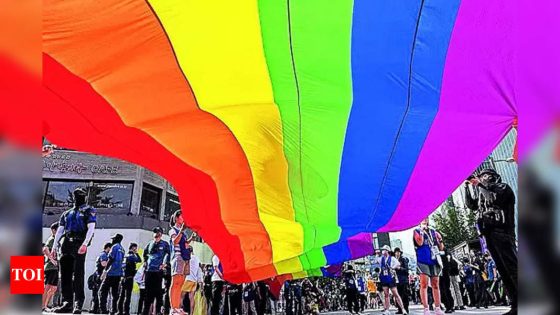NEW DELHI:
When Raman Shah, a 50-year-old Mumbai businessman, mustered the courage to come out of the closet and walk out of a long-term marriage, he was forced to move to another country. Homosexuality was still a crime. As soon as the Supreme Court struck down Section 377, he moved back to India and got legally divorced.
“I come from a very conservative family and most of them still do not accept me,” says Shah (name changed on request).”But at least I know I am not a criminal and cannot be prosecuted. I can meet friends openly and be myself.”
In a society where marriage is still considered a rite of passage, a combination of heteronormative factors – parental pressure, societal norms, denial – had made many gay individuals step into matrimony. But after the 2018 Supreme Court order decriminalised homosexuality and honoured LGBTQ rights, more and more people are emboldened to come out and file for divorce. Interestingly, no matrimonial law mentions sexual preference as grounds for divorce, forcing lawyers to creatively describe the reasons for the annulment.
“A lot of people had not come out of the closet until 377 was read down, so this judgment has definitely been a great anchor,” says Devika Deshmukh-Doshi, a Mumbai family law practitioner who has represented several such cases of people in their forties – mostly where one person is gay and had concealed it.
‘In small towns, families still take cover of hetero marriages’
In some cases, the gay partner has chosen to opt out. In others, the spouse found out and pushed for a divorce. There are also cases where a gay person comes out but continues to stay within the marriage, with the understanding that the partners would lead separate lives.
Some stay good friends and support each other – like a couple where the wife herself brought her introvert gay husband to Gulabi Mela, an annual LGBTQ celebration held in Shivaji Park. Interestingly, gifted mathematician Shakuntala Devi was married to a homosexual man, and had written a book called ‘The World of Homosexuals’ in 1977 in which she described, with great compassion, the struggles of being gay. She remained friends with him all through.
Today, things are changing, especially among younger people for whom the ‘D’ word does not translate into dread. “I now have many more friends choosing themselves over marriage,” says 27-year-old Mumbai doctor Pranav Patil (name changed on request), who came out after his mother inundated him with marriage proposals. “The trauma of the law has gone and now people are creating a whole new blueprint for their lives. Gay people who got married are also seeing others come out so there is a snowball effect.” He adds with a twinkle, “Now I have told my mother that I would like to have an arranged marriage only, but to a man.” (Last year, a five-judge SC bench unanimously ruled against legalising same sex marriage, leaving it to Parliament to decide.) Some people knowingly opt for a ‘lavender marriage’ – an arrangement or understanding that honours the non-sexual aspects of marriage, such as companionship, raising children or looking after elders. In fact, Patil says, “Even after I announced I was gay, I have received three serious proposals from women.”
Although pride rainbows have long spread their affirming colours across the globe, India’s acceptance of homosexuality is still wobbly. Families in smaller towns continue to hide behind the tinsel charade of heterosexual marriage. A recent arranged marriage between a young man and woman in Jaipur, followed by a seven-day-long big fat Indian wedding, ended in a mutually consensual divorce within a year when the young bride found that her husband had zero interest in her and would disappear for long inexplicable stretches of time, evoking the iconic 2005 Ang Lee film, ‘Brokeback Mountain’.
Matrimonial lawyers say couples come to them with complicated cases – a wife may have found pictures of men on her husband’s phone, or a man discovers that his wife’s ‘best friend’ is actually her gay partner. Many are still not comfortable coming out to their parents, or to work colleagues, so they would rather not allow the case to drag on, and close the chapter with divorce by mutual consent.
In cases of mutual consent, partners are not required to state a reason. It is when the divorce is contentious that it gets complicated, for outdated matrimonial laws – whether the Hindu Marriage Act or the Muslim Personal Law or the Special Marriage Act – drafted in the fifties make no mention of homosexuality as grounds for divorce, forcing family court lawyers to tiptoe around facts.
Adultery is very difficult to prove, say lawyers. “Since I cannot say the spouse has a different sexual preference, or I don’t want to mention that the person is gay, I would have to make out a case of mental cruelty or a case of secrecy or fraud – (‘I have noticed is that he hides his phone from me or travels with someone and conceals his locations’) – which can be deemed as an emotional affair resulting in a sustained form of cruelty,” says Deshmukh-Doshi.
She adds it is unfortunate that while sexual preference has not been recognised as grounds for divorce, the laws still allow divorce on the grounds of ‘changing your religion’ or ‘suffering from a mental disorder’.
“If you are taking a call to come out of the closet to your spouse and/or children and file for divorce, you should strengthen yourself and know that people might respond in different ways,” suggests LGBTQ inclusion activist Parmesh Shahani, author of ‘Queeristan’. “It’s useful to seek counselling from a queer affirmative mental health expert as you navigate this. You don’t have to be alone on the journey, ” added Parmesh.
Source Agencies




